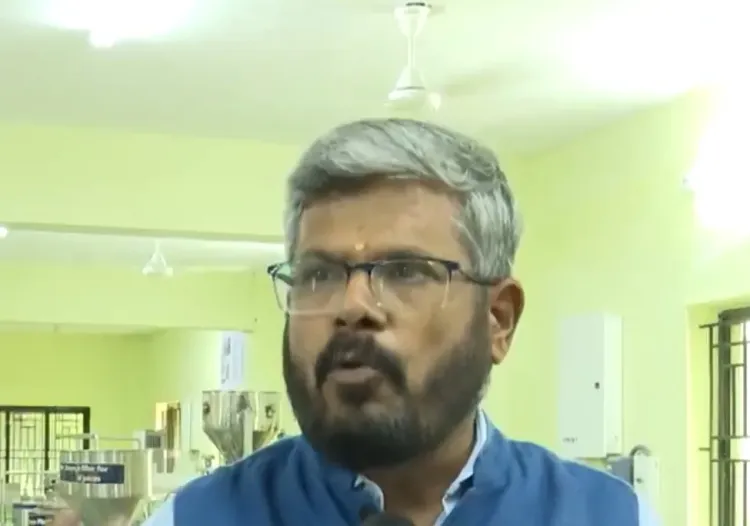How Are Tamil Nadu’s Incubation Hubs Enhancing Rural Livelihoods?

Synopsis
Key Takeaways
- Grassroots innovation is reshaping rural economies.
- Government initiatives empower women entrepreneurs.
- Access to modern infrastructure is vital for success.
- National institutes like NIFTEM provide essential technical support.
- Decentralized economies strengthen local livelihoods.
Tiruchirappalli/Thanjavur, July 10 (NationPress) In a compelling demonstration of how grassroots innovation, technical mentorship, and government-backed initiatives are reshaping India's rural economy, IANS explored two exemplary Food Processing Incubation Centres in Tamil Nadu - one at SASTRA Deemed University in Thanjavur and the other at the ICAR–National Research Centre for Banana (NRCB) in Tiruchirappalli.
Both facilities, established under the PM Formalisation of Micro Food Processing Enterprises (PMFME) Scheme of the Ministry of Food Processing Industries (MoFPI) with technical support from NIFTEM–Thanjavur, are empowering MSMEs, startups, and individual entrepreneurs - particularly women - by providing hands-on training, access to modern infrastructure, and real-world market linkages.
These incubation centres are essential drivers in India’s pursuit of an Atmanirbhar Bharat and the Vocal for Local movement, ensuring that food entrepreneurs from rural areas not only survive but also flourish in the expanding food processing sector.
SASTRA University Centre: Turning milk, cashew, and coconut into rural wealth
Situated just 10 km from Thanjavur, the SASTRA Deemed University Food Processing Incubation Centre has emerged as a crucial training and production hub for rural entrepreneurs. From milk pasteurisation and homogenisation to value-added processing of cashews, coconuts, and bakery products, the facility is effecting significant change.
Prof. Rajan, Dean, School of Chemical and Biotechnology, elaborates:
“Through the PMFME scheme, we’ve established an incubation environment where even those lacking expensive equipment can utilize our facilities to produce paneer, butter, curd, and more. This directly contributes to rural livelihood creation.”
One notable beneficiary is Aishwarya, a woman entrepreneur who received skills training at the centre.
“This initiative from Pradhan Mantri ji empowered me with the confidence and knowledge to launch my own café. I received a loan through the programme and now operate my own business,” she shares.
NIFTEM-T: The powerhouse behind the movement
At the core of both centres’ achievements is NIFTEM-T (National Institute of Food Technology, Entrepreneurship, and Management - Thanjavur). This leading institution, operating under MoFPI, is playing a transformative role in research, innovation, and skill development across India’s food sector.
Prof. V. Palanimuthu, Director of NIFTEM-T, stated to IANS:
“This institute is crucial to India's food processing future. We emphasize innovation, technology transfer, and creating a skilled workforce. Our NABL-accredited food testing lab is also recognized as a National Referral Lab by FSSAI.”
NIFTEM-T offers undergraduate to doctoral programmes in food technology, with flagship admissions through JEE Mains. However, its real-world impact is evident through success stories like that of Rajeshwari Ravi Kumar, who won an award from the President of India in 2015 and later sought technical assistance from NIFTEM.
“I began with merely two products. NIFTEM guided me, allowing me to secure a Rs 10 lakh loan for expansion. Today, I manage a thriving food business in Trichy, Tamil Nadu,” she shared.
Dr. V. Chandrasekar, Associate Professor at NIFTEM, emphasizes:
“We apply scientific methods to develop food products based on sensory analysis. Our training guarantees that every product adheres to quality standards.”
ICAR–NRCB Trichy: Banana is the new gold
The second incubation centre IANS visited is located within the ICAR–National Research Centre for Banana (NRCB) in Tiruchirappalli. This facility specializes in the value addition of bananas and other horticultural products, offering practical training for producing juices, pickles, and bakery items.
Dr. R. Selvarajan, Director, NRCB, explained:
“The centre assists rural entrepreneurs in converting banana-based products into high-value goods. Many who lack industrial equipment can come here, utilize our facilities, and earn a living.”
This model transcends mere value addition — it aims to construct a decentralised economy that connects scientific research with grassroots entrepreneurship.







